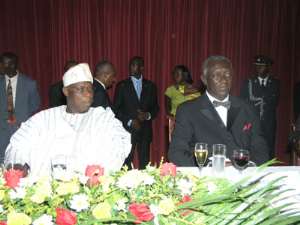
... no action from Ghana Govt ... At a time when negotiations on free trade within the ECOWAS sub region are gaining positive grounds and their realization seemingly near, the sub regional power block, Nigeria, is flexing its muscles, and has outlawed Ghanaian commodities from its market.
Nigeria has placed a ban on the importation of over ninety-six Ghanaian products including textiles, garments, starch, plastics, poultry products and rice among a host of others.
The ban came despite the existence of an ECOWAS treaty on trade liberalization to which Nigeria is a member. Under the ECOWAS Trade Liberalization Treaty, member countries are free to export and import items into each other's country devoid of quotas or any forms of restriction.
Aside protocol agreements, Nigeria also touts itself as Ghana's 'big brother'. The two countries have also had a cordial relationship spanning over several years. Indeed, the warmest of inter-state relations that ever existed within the sub region could unarguably be said to be the one between Ghana and Nigeria.
Just two weeks ago, Nigeria launched its bid for a permanent seat in the United Nation on Ghanaian soil, with all the pageantry and the clamour of a “colossus” as in the words of Ghana's Vice President, Aliu Mahama.
At the said launching ceremony, Nigeria paid glowing tribute to the Pan African spirit of Ghana's first president, Osagyefo Dr. Kwame Nkrumah and even stated that it was in the same spirit that it chose Ghana as the platform to launch the contest.
Ghana and Nigeria are also forerunners in the formation of NEPAD, which seeks the integration of the countries of the sub region.
But in spite of all these, Ghanaian products would not have access to Nigeria markets.
The reason for the trade embargo, according to Honourable John Mahama, Minority Spokesperson on Foreign Affairs and MP for Bole Bamboi, is that Nigeria wants to protect its fledgling manufacturing industries.
According to John Mahama, the National Association of Nigerian Manufacturers had pressurized the government to impose the ban as it became evident that Ghanaian exports were threatening the survival of their businesses. Mahama however suggests that the Heads of States of the two nations initiate a process to resolve the matter.
Mr. Ken Ukaoha, the President-General of the National Association of Nigerian Traders, agrees with Mahama's assertions. He however argues that the ban was an interim measure and is to serve as a breather as ECOWAS took steps to harmonize its trade relations.
He also observed that his country was forced to place the ban as a result of the on-going trade negotiations on the Economic Partnership Agreements (EPAs), which he said were unfair. “Nobody feels happy over the issue. But the current push by Europe and the West on the EPAs means we need to sit back and rethink on how to harmonize our trade rules so that we will not be caught on the wrong footing in our dealings with our partners,” he noted.
But the trade embargo has provoked discomfort among many Ghanaians and has kept many questioning the relevance of ECOWAS. Some Ghanaians have even gone as far as suggesting Ghana withdraws from the ECOWAS.
Though Hon. Kwabena Adusa Okerchiri, Chairman of the Parliamentary select Committee on Foreign Affairs does not agree with the call that Ghana should withdraw from the ECOWAS and thinks such an assertion is far fetched, he agrees that the ban is in “bad taste.” He also agrees with Hon. John Mahama that the presidents of the two countries should resolve the issue.
Trade and Industry Minister, Alan Kyeremanteng and the Minister for Regional Cooperation and NEPAD, Dr Kofi Konadu Apraku, are not happy too.
“Ghana is deeply disturbed about Nigeria's decision. Nigeria took the decision in contravention of laid down rules and regulations,” were the observations of Alan Kyeremanteng, when Public agenda sought his view on the matter.
He however expressed the hope that there was the possibility of an amicable solution to the matter. “We can resolve the problem and we are in the process of initiating a negotiation on it,” he added.
As at June 15 this year, Ghana was to contest the ban at the review meeting of the Head of States on the African Peer Review Mechanism (APRM) in Abuja, Nigeria.
Dr Kofi Konadu Apraku was also quoted in the same period as stating that his Ministry was working in consultation with the Ministry of Trade and Industry to fashion out a strategy to address the situation.
But two months following that announcement, nothing has happened yet.




 Election 2024: Mahama has nothing new to offer Ghanaians, Bwumia is the future –...
Election 2024: Mahama has nothing new to offer Ghanaians, Bwumia is the future –...
 OSP files fresh charges against ex- PPA Boss
OSP files fresh charges against ex- PPA Boss
 Withdraw unreasonable GH¢5.8m fine against former board members – ECG tells PURC
Withdraw unreasonable GH¢5.8m fine against former board members – ECG tells PURC
 Akroma mine attack: Over 20 armed robbers injure workers, steal gold at Esaase
Akroma mine attack: Over 20 armed robbers injure workers, steal gold at Esaase
 Those who understand me have embraced hope for the future — Cheddar
Those who understand me have embraced hope for the future — Cheddar
 Ghana will make maiden voyage into space should Bawumia become President — Chair...
Ghana will make maiden voyage into space should Bawumia become President — Chair...
 Train crash: Despite the sabotage, we shall not be deterred and will persevere —...
Train crash: Despite the sabotage, we shall not be deterred and will persevere —...
 Tema-Mpakadan railway project a perversion of the original viable concept design...
Tema-Mpakadan railway project a perversion of the original viable concept design...
 Train crash: Elsewhere, everyone involved in the test will either be fired or re...
Train crash: Elsewhere, everyone involved in the test will either be fired or re...
